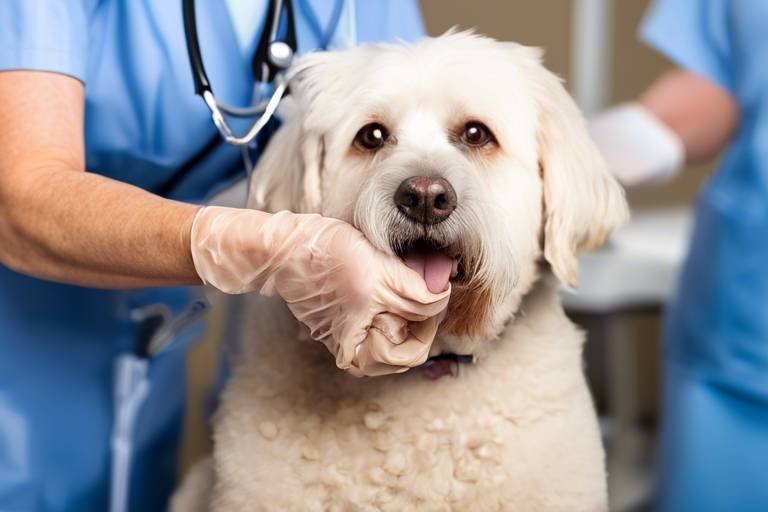Caring for Senior Pets with Kidney Disease
Caring for our beloved furry friends as they age can be both rewarding and challenging, especially when they face health issues like kidney disease. This condition is not just a diagnosis; it’s a journey that requires understanding, compassion, and a proactive approach. Imagine your senior pet as a wise old sage, whose years of companionship deserve the utmost care. As a pet owner, it’s essential to equip yourself with knowledge about kidney disease, its symptoms, treatment options, dietary needs, and how to provide emotional support. By doing so, you can significantly enhance your pet's quality of life, ensuring they remain comfortable and happy during their golden years.
Kidney disease in pets, particularly in seniors, is often a gradual process that can go unnoticed until significant damage has occurred. It’s like a slow leak in a tire; if left unchecked, it can lead to a flat. The kidneys play a crucial role in filtering waste from the blood and maintaining a balance of fluids and electrolytes. When they start to fail, the effects can be profound, impacting your pet's overall health and vitality. Understanding this condition is the first step in providing the best care possible.
As you navigate this challenging landscape, remember that early detection is key. Regular veterinary check-ups can help catch kidney disease in its early stages, allowing for timely interventions that can make a world of difference. Think of it as regular maintenance for a car; a little attention can prevent major issues down the road. So, let’s dive deeper into what kidney disease entails and how you can be the best advocate for your senior pet's health.
Kidney disease can stem from various causes, including genetics, age, and underlying health conditions. As pets age, their kidneys may naturally lose some function, akin to how our eyesight might decline as we grow older. Recognizing the symptoms early is crucial. Look for signs like increased thirst and urination, weight loss, and lethargy. These are your pet’s way of saying, "Hey, something's not quite right!" If you notice these changes, it’s time to schedule a vet visit.
Identifying the symptoms of kidney disease is crucial for early diagnosis. Common signs include:
- Increased thirst: Your pet may drink more water than usual.
- Frequent urination: You might notice more frequent trips outside or to the litter box.
- Weight loss: Unexplained weight loss can be a red flag.
- Lethargy: A noticeable decrease in energy or enthusiasm can signal trouble.
If you observe any of these symptoms, it’s essential to consult with a veterinarian promptly. Early intervention can lead to better management of the disease and a longer, healthier life for your pet.
Veterinarians utilize various diagnostic tests to assess kidney function, including blood tests and urinalysis. Understanding these tests can help you make informed decisions regarding your pet's health.
Blood tests measure levels of waste products in the bloodstream, indicating how well the kidneys are functioning. Regular monitoring can help track the progression of kidney disease. Think of it as a check-up for your pet's internal health; it provides vital information that can guide treatment decisions.
Urinalysis evaluates urine concentration and the presence of protein or blood. This test aids in diagnosing kidney disease and assessing its severity. It’s like looking at a window into your pet's health, revealing insights that might not be visible otherwise.
When it comes to managing kidney disease, there are several treatment options available. These can include medications to help manage symptoms, fluid therapy to prevent dehydration, and in some cases, surgical interventions. The goal is to improve your pet's quality of life and manage the disease effectively. Just like humans, every pet is unique, and treatment plans should be tailored to their specific needs.
A specialized diet is essential for pets with kidney disease. Low-protein, low-phosphorus diets are crucial in managing this condition. Choosing the right food can feel overwhelming, but it’s vital for your pet's well-being. You wouldn’t put low-grade fuel in a high-performance car, right? The same logic applies to your pet’s diet.
Ensuring proper hydration is vital for pets with kidney disease. Dehydration can exacerbate their condition, so it’s essential to encourage water intake. Strategies include providing fresh water, using water fountains, or incorporating wet food into their diet. Think of it as keeping your pet's engine cool; hydration helps everything run smoothly.
Certain supplements can support kidney function and overall health in senior pets. Options like omega-3 fatty acids and antioxidants can enhance their well-being. These supplements act like a safety net, providing additional support as your pet navigates the challenges of kidney disease.
Caring for a senior pet with kidney disease can be emotionally challenging. It’s essential to provide comfort and companionship, ensuring they feel loved and secure during their treatment journey. Spend quality time with your pet, engage in gentle play, and offer plenty of cuddles. Your presence can be incredibly soothing, much like a warm blanket on a chilly day.
Q: How can I tell if my pet is in pain from kidney disease?
A: Watch for signs such as changes in behavior, reluctance to move, or vocalizing. If you suspect pain, consult your veterinarian.
Q: Can kidney disease be cured?
A: Unfortunately, kidney disease is often progressive and cannot be cured. However, with proper management, your pet can live a comfortable life.
Q: What should I feed my pet with kidney disease?
A: A low-protein, low-phosphorus diet is recommended. Consult your vet for specific dietary recommendations tailored to your pet’s needs.
Q: How can I help my pet stay hydrated?
A: Encourage water intake by providing fresh water, using fountains, and offering wet food. You can also try adding water to dry food.

Understanding Kidney Disease in Pets
This article provides insights into managing kidney disease in senior pets, offering guidance on symptoms, treatment options, dietary needs, and emotional support to enhance the quality of life for our furry companions.
Kidney disease in pets, particularly in our beloved senior companions, can often feel like an insurmountable challenge. It's essential to understand that the kidneys play a crucial role in filtering waste from the blood, regulating hydration, and maintaining overall health. As pets age, their kidneys may become less efficient, leading to a variety of health issues. This gradual decline can be attributed to several factors, including genetics, diet, and underlying health conditions.
Recognizing the signs of kidney disease early on is vital. Just like in humans, the kidneys in pets can suffer from chronic kidney disease (CKD), which is often progressive and irreversible. The symptoms might not be immediately apparent, and many pet owners might mistake them for the natural aging process. However, understanding kidney disease means being proactive. Regular veterinary check-ups can help catch any potential issues before they escalate.
Some common causes of kidney disease in pets include:
- Age: Older pets are at a higher risk.
- Genetics: Certain breeds are predisposed to kidney issues.
- Diet: Poor nutrition can lead to kidney strain.
- Infections: Urinary tract infections can contribute to kidney problems.
As pet owners, we must be vigilant and observant. Changes in behavior, such as increased thirst or altered bathroom habits, can be early indicators of kidney problems. It's like having a window into their health; the more we pay attention, the clearer the picture becomes. If you notice any of these changes, it is essential to consult your veterinarian as soon as possible. They can perform the necessary tests to determine the health of your pet's kidneys and recommend appropriate treatments.
Veterinarians utilize various diagnostic tests to assess kidney function. Understanding these tests can help you make informed decisions regarding your pet's health. The two most common tests are blood tests and urinalysis.
Blood tests measure levels of waste products in the bloodstream, indicating how well the kidneys are functioning. Elevated levels of substances like urea and creatinine in the blood can signal kidney dysfunction. Regular monitoring can help track the progression of kidney disease, allowing for timely interventions.
Urinalysis provides insights into kidney health by evaluating urine concentration and the presence of protein or blood. This test can help diagnose kidney disease and assess its severity. For instance, if your pet's urine is too dilute, it may indicate that their kidneys are not concentrating urine effectively, which is a red flag.
In summary, understanding kidney disease in pets involves recognizing the risks, symptoms, and the importance of regular veterinary care. By being proactive and informed, you can significantly enhance your pet's quality of life, even in the face of such a challenging diagnosis.
What are the early signs of kidney disease in pets?
Early signs include increased thirst, frequent urination, weight loss, and lethargy. If you notice these changes, it's important to consult your veterinarian.
Can kidney disease be cured?
Unfortunately, kidney disease is often chronic and progressive, meaning it cannot be cured. However, with appropriate management, pets can lead comfortable lives.
What dietary changes should I make for my pet with kidney disease?
A low-protein, low-phosphorus diet is often recommended for pets with kidney disease. Consult your veterinarian for specific dietary recommendations tailored to your pet's needs.
How can I ensure my pet stays hydrated?
Encouraging your pet to drink more water can be achieved by providing fresh water, using water fountains, or incorporating wet food into their diet.

Symptoms to Watch For
Recognizing the symptoms of kidney disease in senior pets is crucial for early diagnosis and effective treatment. Just like humans, our furry friends can exhibit a range of signs that indicate something might be off. The earlier you notice these symptoms, the better the chances of managing the condition and enhancing your pet's quality of life. So, what should you be on the lookout for? Here are some key indicators:
One of the first signs you might notice is increased thirst. If your pet seems to be drinking more water than usual, it could be a red flag. This increased thirst often leads to frequent urination, where you find yourself taking your pet out more often than before. It's almost as if they have their own personal bathroom schedule! These two symptoms often go hand in hand and can indicate that the kidneys are struggling to concentrate urine effectively.
Another symptom that can be quite alarming is weight loss. If your once-robust pet is starting to look a bit gaunt, it’s time to take notice. Weight loss in pets can be subtle at first, but it often becomes more evident as the disease progresses. Coupled with weight loss, you may also observe lethargy. Your pet might seem less enthusiastic about their favorite activities, like playing fetch or going for a walk, and may prefer to lounge around instead. This change in behavior is not just a phase; it’s a signal that your pet might be feeling unwell.
Other symptoms to keep an eye on include:
- Bad breath: A distinct ammonia smell can indicate kidney issues.
- Vomiting: Frequent vomiting can be a sign of advanced kidney disease.
- Diarrhea: Changes in bowel habits might also occur.
It’s essential to remember that these symptoms can vary from one pet to another. Some pets may exhibit all of these signs, while others may only show a few. If you notice any of these symptoms, it’s crucial to consult with your veterinarian as soon as possible. Early intervention can lead to more effective management of kidney disease and can significantly improve your pet's quality of life.
To further understand your pet's health, your veterinarian may recommend several diagnostic tests. These tests will help determine the extent of kidney damage and guide the treatment plan.
| Test | Purpose |
|---|---|
| Blood Tests | Measure waste product levels in the bloodstream to assess kidney function. |
| Urinalysis | Evaluate urine concentration and check for the presence of protein or blood. |
Understanding these diagnostic tests and their significance can empower you as a pet owner. You’ll be better equipped to discuss your pet’s health with your veterinarian and make informed decisions about their treatment.
Once diagnosed, your veterinarian will outline various treatment options tailored to your pet's specific needs. These may include medications to manage symptoms, fluid therapy to keep your pet hydrated, and possibly even surgical interventions in severe cases. Each treatment aims to enhance your pet's comfort and prolong their life, allowing you to cherish those precious moments together.
Q: What should I do if I notice symptoms of kidney disease in my pet?
A: If you observe any symptoms such as increased thirst, frequent urination, or weight loss, it's crucial to schedule an appointment with your veterinarian as soon as possible.
Q: Can kidney disease be treated?
A: While kidney disease cannot be cured, it can often be managed with appropriate treatment, dietary changes, and regular veterinary care.
Q: How can I help my pet feel more comfortable?
A: Providing a quiet, comfortable space, ensuring they stay hydrated, and offering gentle companionship can help your pet feel more secure and loved during their treatment.
Common Diagnostic Tests
When it comes to diagnosing kidney disease in our beloved senior pets, veterinarians have a variety of diagnostic tests at their disposal. These tests are crucial for assessing kidney function and determining the best course of action for treatment. The two most commonly used tests are blood tests and urinalysis. Understanding these tests can empower you as a pet owner to make informed decisions about your furry friend's health.
Blood tests are particularly important because they measure levels of waste products in the bloodstream, such as creatinine and blood urea nitrogen (BUN). Elevated levels of these substances can indicate that the kidneys are not functioning optimally. Regular monitoring through blood tests can help track the progression of kidney disease over time. For instance, if your pet's blood test shows a gradual increase in creatinine levels, it may signal the need for a change in treatment or diet.
On the other hand, urinalysis provides a different but equally vital perspective on kidney health. This test evaluates the concentration of urine and checks for the presence of protein or blood, which can be signs of kidney damage. A healthy kidney typically produces concentrated urine, while a compromised kidney may result in diluted urine. This test can also help assess the severity of kidney disease, giving your veterinarian a clearer picture of your pet's condition.
| Test Type | Purpose | What It Measures |
|---|---|---|
| Blood Test | Assess kidney function | Levels of waste products (creatinine, BUN) |
| Urinalysis | Evaluate urine concentration | Presence of protein, blood, and other substances |
In summary, both blood tests and urinalysis are essential tools that veterinarians use to diagnose and monitor kidney disease in senior pets. By understanding these tests, you can be proactive in your pet's healthcare journey. Remember, early detection can make a significant difference in managing kidney disease and improving your pet's quality of life.
- What are the signs that my pet may have kidney disease? Look for symptoms like increased thirst, frequent urination, weight loss, and lethargy.
- How often should my senior pet have kidney function tests? Regular check-ups every 6 to 12 months are recommended, depending on your pet's health status.
- Can kidney disease be treated? Yes, while it cannot be cured, various treatments can help manage the disease and improve your pet's quality of life.
- What dietary changes should I consider for my pet? A low-protein, low-phosphorus diet is often recommended, along with ensuring proper hydration.
Blood Tests
When it comes to managing kidney disease in our beloved senior pets, are a crucial tool in the veterinary toolbox. These tests help us understand how well your pet's kidneys are functioning by measuring the levels of waste products in the bloodstream. Imagine your pet's body as a bustling city; the kidneys are like the sanitation department, working tirelessly to filter out toxins and waste. When this department starts to falter, it’s essential to catch it early to prevent further complications.
During a blood test, veterinarians typically look for key indicators that can signal kidney issues. The two primary waste products measured are urea and creatinine. Elevated levels of these substances can suggest that the kidneys are not filtering waste effectively. Think of it as an overflowing trash can; when the trash isn’t taken out regularly, it begins to pile up, creating a mess. The same principle applies to your pet’s bloodstream. Regular blood tests can help track these levels over time, allowing you to monitor the progression of kidney disease and adjust treatment plans accordingly.
Additionally, blood tests can reveal other important factors, such as electrolyte imbalances, which can lead to further health issues. For instance, high potassium levels can be particularly dangerous and may require immediate intervention. Thus, these tests are not just about assessing kidney function; they provide a comprehensive picture of your pet’s overall health. Understanding these results can empower you as a pet owner to make informed decisions about your furry friend’s care.
In summary, regular blood tests are vital for early detection and ongoing management of kidney disease in senior pets. By keeping a close eye on the levels of waste products in your pet's blood, you can work alongside your veterinarian to ensure that your beloved companion receives the best possible care. Just like a good mechanic can spot potential issues in a car before they become serious problems, blood tests can help you catch kidney disease before it spirals out of control.
- How often should my pet have blood tests? - It's generally recommended that senior pets with kidney disease have blood tests every 3 to 6 months, but your vet will provide guidance based on your pet's individual needs.
- What should I do if my pet's blood test results are abnormal? - If your pet's results indicate kidney issues, consult with your veterinarian to discuss treatment options and lifestyle changes.
- Are there any risks associated with blood tests? - Blood tests are typically safe, but as with any medical procedure, there can be minor risks such as bruising or infection at the site of the blood draw.
Urinalysis
Urinalysis is a crucial diagnostic tool that provides valuable insights into your pet's kidney health. It involves analyzing a urine sample to evaluate various components that can indicate how well the kidneys are functioning. This test is not just a routine procedure; it's a window into your furry friend's internal world, helping veterinarians make informed decisions about their care. When your pet is diagnosed with kidney disease, understanding the results of a urinalysis can be essential in assessing the severity of the condition and tailoring a treatment plan.
During a urinalysis, the veterinarian will examine several key factors:
- Urine Concentration: This measures how well the kidneys are concentrating urine. In the case of kidney disease, you might notice a lower concentration, which indicates that the kidneys are not filtering waste effectively.
- Presence of Protein: The detection of protein in the urine can be a red flag. Healthy kidneys typically prevent protein from leaking into the urine, so its presence can suggest damage to the kidney's filtering units.
- Presence of Blood: Blood in the urine can indicate various issues, including infections or kidney stones, and warrants further investigation.
Additionally, urinalysis can reveal the pH level of the urine, which can help identify underlying conditions. A balanced pH is crucial for overall health, and deviations can signal problems that need addressing. The results of this analysis can guide your veterinarian in determining not only the current state of your pet's kidney function but also how to monitor changes over time.
In summary, urinalysis is more than just a test; it’s an essential part of managing your senior pet's kidney disease. By keeping a close eye on these results, you can work with your veterinarian to ensure your beloved companion receives the best possible care, allowing them to maintain a better quality of life.
Q: How often should my pet have a urinalysis?
A: It's generally recommended to have a urinalysis performed at least once a year for senior pets or more frequently if they have been diagnosed with kidney disease, as advised by your veterinarian.
Q: What should I do if my pet's urinalysis shows abnormal results?
A: If your pet's urinalysis reveals any abnormalities, it's important to follow up with your veterinarian to discuss further diagnostic tests or treatment options.
Q: Can I collect a urine sample at home?
A: Yes, you can collect a urine sample at home using a clean container, but it's best to consult your veterinarian for guidance on how to do this properly to ensure accurate results.
Veterinary Treatment Options
Caring for a senior pet diagnosed with kidney disease can feel overwhelming, but understanding the available can empower you to make informed choices. The journey begins with your veterinarian, who will tailor a treatment plan based on your pet's specific condition and needs. Treatment options typically include medications, fluid therapy, and in some cases, surgical interventions. Each of these plays a crucial role in managing kidney disease and enhancing your pet's quality of life.
Medications are often prescribed to help manage symptoms and slow the progression of kidney disease. These can include phosphate binders to reduce phosphorus levels in the blood, as well as medications to control blood pressure and manage anemia. It's essential to follow your veterinarian's instructions regarding dosage and administration, as these medications can significantly improve your pet's comfort and health.
Fluid therapy is another vital component of treatment. Many pets with kidney disease suffer from dehydration due to increased urination and decreased thirst. Administering fluids—either through injections at the vet's office or at home—can help maintain hydration and support kidney function. This treatment not only helps flush out toxins but also alleviates some of the stress on the kidneys, providing a much-needed boost to your pet's overall health.
In some cases, surgical options may be considered. For example, if your pet has a urinary blockage or a mass affecting kidney function, surgery might be necessary to restore normal function. It's important to discuss the risks and benefits of surgical interventions with your veterinarian, as well as the potential impact on your pet's quality of life.
To give you a clearer picture, here's a table summarizing the common veterinary treatment options for kidney disease:
| Treatment Option | Description |
|---|---|
| Medications | Includes phosphate binders, blood pressure medications, and anemia treatments. |
| Fluid Therapy | Administering fluids to combat dehydration and support kidney function. |
| Surgery | Interventions for urinary blockages or masses affecting kidney health. |
Ultimately, the right combination of treatments can make a world of difference for your furry friend. Regular check-ups and open communication with your veterinarian will ensure that your pet receives the best possible care. Remember, managing kidney disease is a journey, and with the right support, you can help your beloved companion navigate it with greater ease and comfort.
- What are the early signs of kidney disease in pets? Early signs include increased thirst, frequent urination, and changes in appetite.
- Can kidney disease be cured? Unfortunately, kidney disease is often progressive and cannot be cured, but it can be managed effectively.
- How often should my pet see the vet? Regular veterinary visits are crucial; typically, every 6 months for pets with kidney disease.
- What dietary changes should I make for my pet? A low-protein, low-phosphorus diet is often recommended to support kidney health.

Dietary Considerations for Kidney Health
Caring for a senior pet with kidney disease involves a careful examination of their dietary needs. Just like us, our furry friends require specific nutrients to maintain their health, especially when their kidneys are not functioning optimally. A specialized diet is essential to help manage the disease and improve their overall quality of life. It's crucial to focus on low-protein and low-phosphorus diets, as excessive amounts of these nutrients can put additional strain on already compromised kidneys. But what does that mean for your pet's meals?
When selecting food for your pet, consider options that are specifically formulated for kidney health. These diets typically contain higher levels of omega-3 fatty acids and antioxidants, which can help reduce inflammation and support kidney function. Additionally, the right food can help manage the symptoms of kidney disease, such as nausea and loss of appetite, ensuring your pet gets the nutrition they need.
It’s also vital to pay attention to the hydration aspect of your pet’s diet. Adequate water intake is essential for flushing out toxins and supporting kidney function. You might find that your pet is more inclined to drink water if it’s fresh and readily available. Consider investing in a pet water fountain to encourage them to drink more. You can also incorporate wet food into their diet, which not only provides moisture but can be more palatable for pets who may be experiencing a decreased appetite.
Here are a few dietary considerations to keep in mind:
- Protein Quality: Focus on high-quality protein sources that are easier for your pet’s body to process.
- Phosphorus Levels: Look for foods that are low in phosphorus to help reduce the workload on the kidneys.
- Hydration: Always ensure fresh water is available and consider wet food options.
Furthermore, supplements can play a significant role in supporting kidney health. Nutritional aids such as omega-3 fatty acids can help reduce inflammation, while antioxidants may combat oxidative stress. Always consult your veterinarian before adding any supplements to your pet's diet, as they can provide tailored recommendations based on your pet's specific health needs.
In conclusion, managing your senior pet’s diet when they have kidney disease is not just about restricting certain foods; it’s about enhancing their overall well-being. By choosing the right foods and ensuring proper hydration, you can significantly improve their quality of life and help them thrive during this challenging time.
Q1: Can I feed my senior pet regular dog food?
A1: It's best to avoid regular dog food if your pet has kidney disease. Opt for specially formulated diets that support kidney health.
Q2: How can I tell if my pet is dehydrated?
A2: Signs of dehydration include dry gums, lethargy, and a decrease in appetite. If you suspect dehydration, consult your veterinarian immediately.
Q3: Are there any specific treats I can give my pet?
A3: Look for kidney-friendly treats that are low in protein and phosphorus. Always check with your vet for recommendations.
Hydration and Its Importance
When it comes to managing kidney disease in senior pets, hydration is paramount. Just think about it: our furry friends, much like us, rely on water to keep their bodies functioning optimally. For pets with compromised kidney function, staying hydrated can significantly impact their overall health and quality of life. Dehydration can exacerbate kidney issues, leading to a downward spiral that we all want to avoid.
One of the most effective ways to ensure your pet remains hydrated is by offering them fresh, clean water at all times. You might be surprised to learn that many pets prefer running water over still water. This is where pet water fountains come into play. These fountains not only provide a continuous flow of fresh water but also entice your pet to drink more. After all, who can resist the allure of a bubbling brook?
In addition to providing fresh water, incorporating wet food into your pet's diet can also boost their hydration levels. Wet food typically contains around 70-80% moisture, which can be a game-changer for pets who are reluctant to drink enough water. If your pet is on a dry food diet, consider mixing in some wet food or switching to a brand that offers both options. This can be a delicious way to keep them hydrated!
For those times when your pet may not be drinking enough, you can also try to enhance their water intake with some creative tactics:
- Add a splash of low-sodium chicken or beef broth to their water bowl to make it more appealing.
- Offer ice cubes made from broth or pureed fruits as a treat on hot days.
- Encourage them to drink by offering water in different bowls around the house to pique their interest.
Monitoring your pet's hydration status is also crucial. Signs of dehydration include dry gums, lethargy, and decreased skin elasticity. If you notice any of these symptoms, it’s essential to consult your veterinarian immediately. They may recommend subcutaneous fluid therapy, which can be administered at home or in the clinic, to help keep your pet hydrated.
In conclusion, ensuring your senior pet with kidney disease stays hydrated is a key aspect of their care. By providing fresh water, incorporating wet food into their diet, and using creative methods to encourage drinking, you can play a significant role in enhancing their health and well-being. Remember, a well-hydrated pet is a happy pet!
- How can I tell if my pet is dehydrated? Look for signs such as dry gums, lethargy, and decreased skin elasticity. If in doubt, consult your veterinarian.
- Should I switch to wet food for my senior pet? Yes, wet food can help increase hydration levels, which is particularly beneficial for pets with kidney disease.
- Can I give my pet broth instead of water? Yes, low-sodium broth can be a great way to encourage your pet to drink more. Just ensure it’s safe for them!
- What are the best ways to encourage my pet to drink more water? Try using pet water fountains, offering ice cubes, or adding flavor to their water to make it more appealing.
Supplements and Nutritional Aids
Caring for senior pets with kidney disease often involves more than just regular veterinary visits and a special diet. One of the most effective ways to support your furry friend’s health is through the use of . These can play a significant role in enhancing kidney function and overall well-being. As you navigate this journey, it's essential to understand which supplements can be beneficial and how they can complement your pet's treatment plan.
First and foremost, omega-3 fatty acids are a fantastic addition to your senior pet's diet. Derived from fish oil, these fatty acids have anti-inflammatory properties that can help reduce inflammation in the kidneys, potentially slowing the progression of kidney disease. Studies have shown that omega-3s can also improve appetite and overall energy levels, which is crucial for pets who may be feeling lethargic due to their condition.
Another beneficial supplement is antioxidants, such as vitamins E and C. These nutrients combat oxidative stress, which can worsen kidney function over time. By incorporating antioxidants into your pet's diet, you can help protect their kidneys from damage caused by free radicals. Some pet owners find that adding a high-quality antioxidant supplement can improve their pet's vitality and quality of life significantly.
Additionally, probiotics can be a game-changer for senior pets with kidney issues. These beneficial bacteria support gut health, which is closely linked to overall health, including kidney function. A healthy gut can enhance nutrient absorption and may even help reduce the workload on the kidneys by improving the elimination of waste products. When selecting a probiotic, look for one specifically formulated for pets, as their digestive systems differ from ours.
Lastly, phosphate binders may be recommended by your veterinarian if your pet's phosphorus levels are elevated. These supplements work by binding to the phosphorus in food, preventing its absorption and helping maintain optimal kidney function. It's crucial to work closely with your vet to monitor your pet's blood work and adjust supplements as necessary to ensure they are getting the right support.
When considering supplements, always consult with your veterinarian first. They can provide tailored advice based on your pet's specific condition and needs. It's essential to choose high-quality products from reputable brands to ensure your pet receives the best possible care. Remember, supplements should complement, not replace, a balanced diet and veterinary treatments.
In conclusion, incorporating the right supplements and nutritional aids into your senior pet's care can significantly enhance their quality of life. By focusing on omega-3 fatty acids, antioxidants, probiotics, and phosphate binders, you can provide your furry companion with the support they need to thrive despite kidney disease. Always keep the lines of communication open with your vet to ensure you're making the best choices for your beloved pet.
- What are the signs that my pet may need supplements? Look for changes in energy levels, appetite, and overall health. If your pet seems more lethargic or is losing weight, it may be time to consult your vet about supplements.
- Can I give my pet human supplements? It's essential to use supplements specifically formulated for pets, as human supplements may not be safe or effective for animals.
- How long does it take to see improvements after starting supplements? Improvements can vary based on the supplement type and your pet's individual condition. Some pets may show improvement within a few weeks, while others may take longer.

Providing Emotional Support
Caring for a senior pet with kidney disease can be an emotional rollercoaster, both for you and your furry companion. It's not just about managing their physical health; it's equally important to nurture their emotional well-being. Pets are incredibly perceptive and can sense when their owners are worried or stressed. So, how can you ensure your pet feels secure and loved during this challenging time? Here are some strategies to consider.
First and foremost, spending quality time with your pet is essential. Engaging in their favorite activities, whether it's a gentle walk, playing with their favorite toy, or simply cuddling on the couch, can provide immense comfort. Remember, your presence is a powerful source of reassurance. Just like humans, pets thrive on affection and companionship, especially when they are feeling unwell.
Another effective way to provide emotional support is to maintain a consistent routine. Animals are creatures of habit, and a predictable schedule can help reduce anxiety. This means sticking to regular feeding times, bathroom breaks, and play sessions. It gives your pet a sense of normalcy, which can be incredibly soothing during a time of uncertainty.
Additionally, consider creating a calm and comfortable environment for your pet. This could involve setting up a cozy space with their favorite blanket or bed in a quiet area of the house. Dimming the lights and minimizing loud noises can also help create a serene atmosphere. Just as we find comfort in our safe spaces, pets also benefit from having a tranquil spot where they can retreat when they need a break.
Moreover, don't underestimate the power of positive reinforcement. During this time, your pet may experience mood swings or changes in behavior due to their illness. Offering treats, praise, or gentle petting when they exhibit positive behavior can help boost their spirits. It's like giving them a little pat on the back, reminding them that they're doing great despite the challenges they face.
Lastly, if you're feeling overwhelmed, consider reaching out to a pet support group or a professional who specializes in pet therapy. Connecting with others who are going through similar experiences can provide valuable insights and emotional relief. Just as we seek support from friends and family during tough times, our pets can also benefit from the love and understanding of others.
| Emotional Support Strategies | Description |
|---|---|
| Quality Time | Engage in favorite activities to provide comfort. |
| Consistent Routine | Maintain a predictable schedule to reduce anxiety. |
| Calm Environment | Create a soothing space for your pet to relax. |
| Positive Reinforcement | Encourage good behavior with treats and praise. |
| Seek Support | Connect with pet support groups or professionals. |
In conclusion, providing emotional support to your senior pet with kidney disease is a multifaceted approach that requires patience, love, and understanding. By focusing on their emotional needs alongside their physical care, you can help enhance their quality of life and strengthen the bond you share. Remember, your pet relies on you not just as their caregiver, but as their greatest ally in navigating this challenging journey.
- How can I tell if my pet is feeling anxious? Look for signs such as excessive barking, pacing, hiding, or changes in appetite.
- What can I do to make my pet feel more comfortable at home? Create a quiet, cozy space for them, maintain a routine, and spend quality time together.
- Are there specific activities I should avoid with my pet? Avoid strenuous activities that can tire them out or cause stress; opt for gentle play instead.
- How can I support my pet emotionally during vet visits? Bring their favorite toy or blanket, and stay calm to help ease their anxiety.
Frequently Asked Questions
-
What are the early signs of kidney disease in senior pets?
Early signs of kidney disease can be subtle, but they often include increased thirst, frequent urination, weight loss, and lethargy. If you notice any of these symptoms, it’s crucial to consult your veterinarian as soon as possible for a proper diagnosis.
-
How can I help my pet stay hydrated?
Keeping your pet hydrated is vital for their kidney health. You can encourage them to drink more water by providing fresh water daily, using water fountains, or incorporating wet food into their diet. Some pets are more likely to drink from a fountain, as the flowing water can be more enticing!
-
What dietary changes should I make for my pet with kidney disease?
A low-protein, low-phosphorus diet is essential for pets with kidney disease. Look for specially formulated kidney diets that help manage waste products in the body. Always consult your veterinarian before making any significant changes to your pet's diet to ensure it meets their specific needs.
-
Are there any supplements I can give my pet?
Yes, certain supplements can support kidney function and overall health. Omega-3 fatty acids and antioxidants are popular choices that may help improve your pet's well-being. However, it's essential to discuss any supplements with your veterinarian to ensure they're appropriate for your pet's condition.
-
How often should my pet see the veterinarian for kidney disease?
Regular veterinary check-ups are crucial for managing kidney disease. Typically, your veterinarian may recommend visits every 3 to 6 months, depending on the severity of the condition. These visits allow for monitoring kidney function and adjusting treatment plans as necessary.
-
What emotional support can I provide to my pet during treatment?
Caring for a senior pet with kidney disease can be emotionally taxing for both you and your pet. Providing comfort through gentle petting, spending quality time together, and maintaining a calm environment can help your pet feel secure and loved throughout their treatment journey.



















